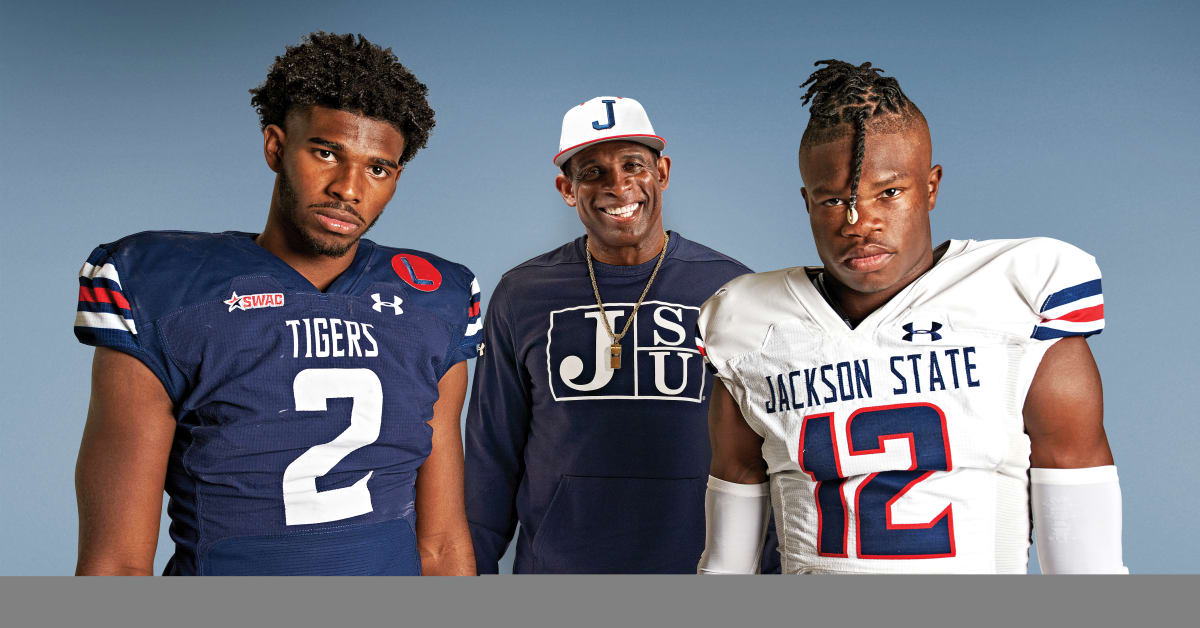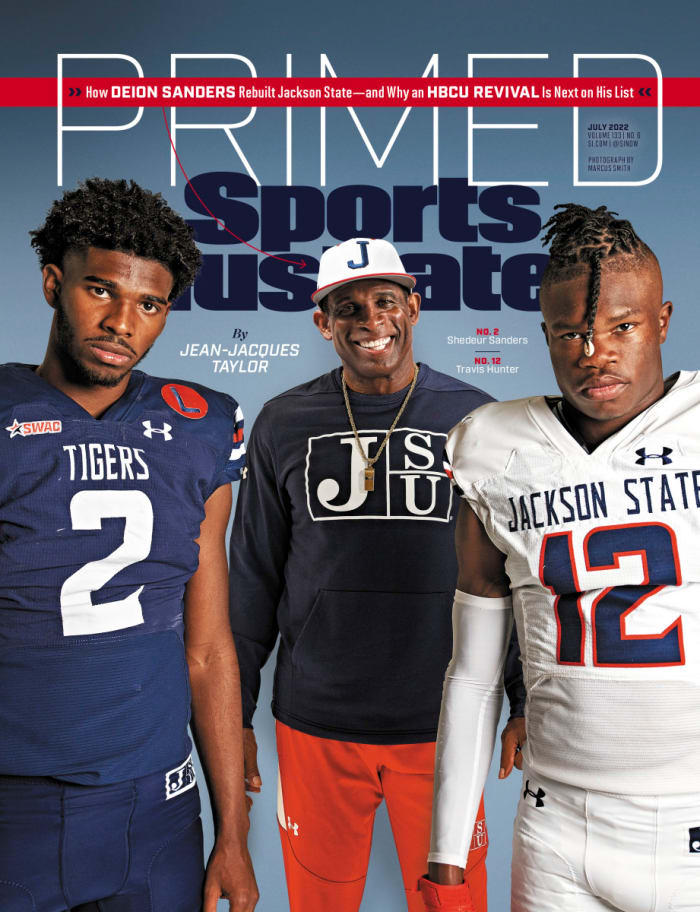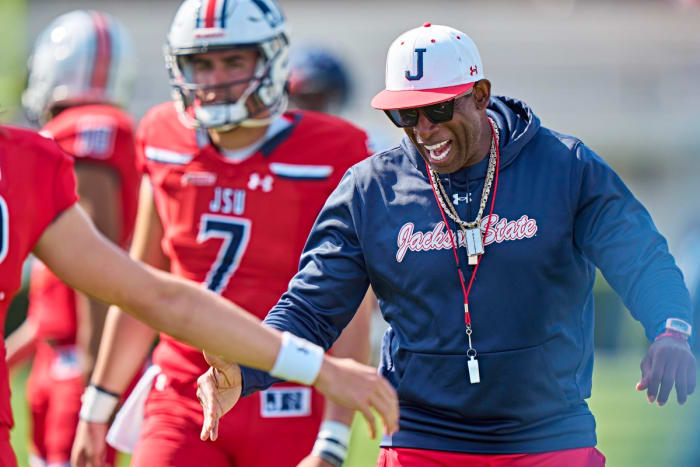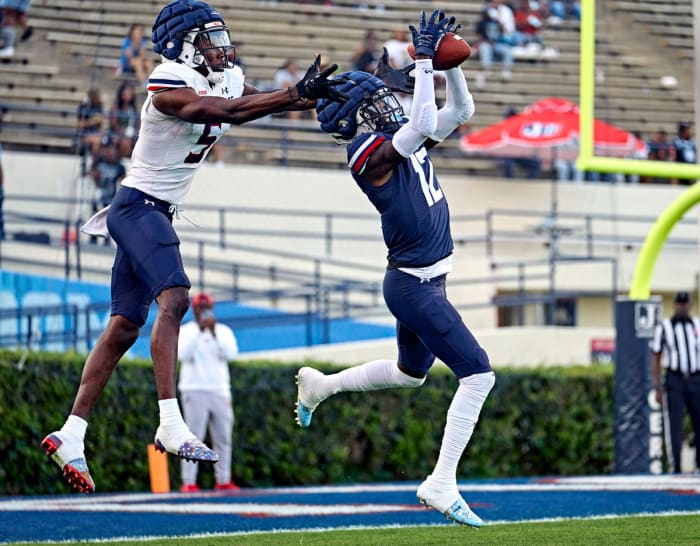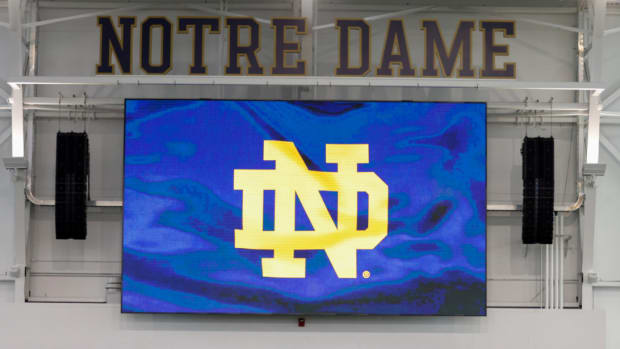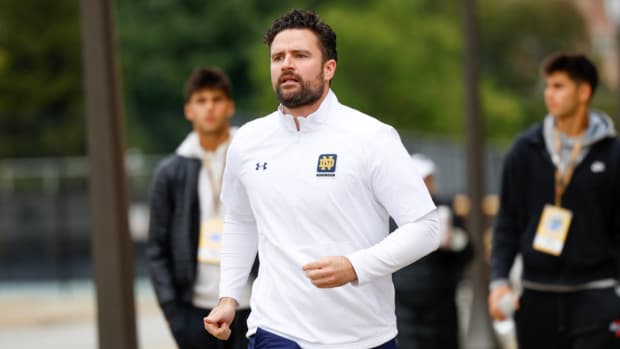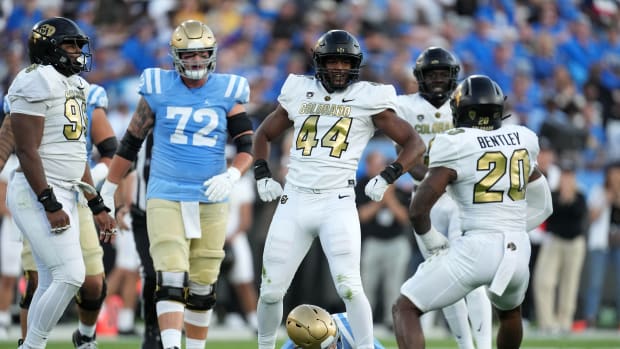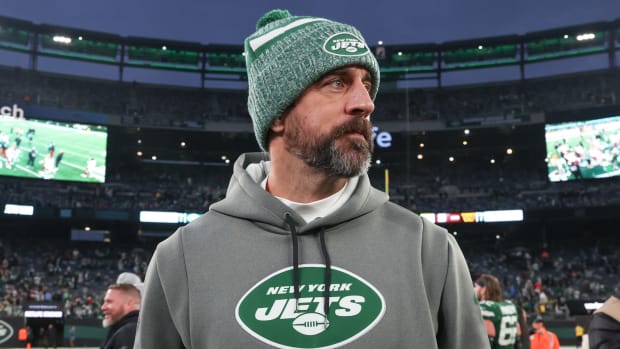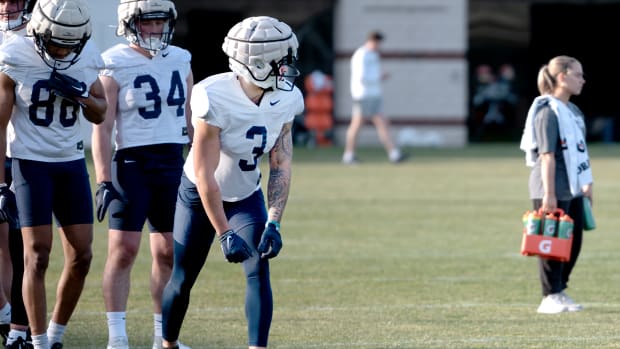How Deion Sanders Is Fueling the Rise of HBCU Football
A rolled up piece of paper the size of a marble sits on the floor, and Deion Sanders just can’t stop staring at it.
Five seconds. Ten seconds.
Sanders has stopped answering questions. He’s at a local eatery in the trendy Deep Ellum section of Dallas, and he’s ignoring his grilled chicken sandwich and fries.
He leans forward, oddly captivated by a singular piece of trash nine feet away.
Fifteen seconds. Twenty seconds.
“I’m looking at a white piece of paper on the floor and I’m wondering: How did that get there? The carpet is black, so you can see it plain as day,” Sanders says. “It’s misplaced. It shouldn’t be there.”
For Sanders, it’s instinct to look at a situation, see what it needs and try to fix it, instead of turning away. Says Sanders: “I can’t do that.”
These days, this is the situation Sanders is addressing: transforming Jackson State’s football program into a powerhouse and making historically Black college and university (HBCU) football relevant again. He arrived on campus in September 2020 with a plan to return Jackson State’s moribund program to its glory days of the 1970s, ’80s and ’90s, when the Tigers were synonymous with winning and regularly produced NFL players—it’s the alma mater of Walter Payton, among four Pro Football Hall of Famers from the school. How far had the program fallen? In the eight seasons before Sanders took over, JSU had employed four head football coaches and four athletic directors.
In 2018, Ashley Robinson arrived promising change. The new AD had grown up in Jackson, Miss., but his hometown school hadn’t offered him a scholarship, so he played point guard at Mississippi Valley State instead. Still, he understood the football team’s importance in the community, and he knew a strong program would lift up Mississippi’s capital city.
And he had ideas about what that would take. When Robinson heard Sanders, on an NFL Network broadcast in 2019, mention his desire to coach, he moved in. In August 2020, Robinson fired John Hendrick, after just one full season as coach, and pursued his man. The result: “There’s been no hire who made a bigger impact on a program than Coach Prime,” Robinson says.
Last year, in his first full season, Sanders led the Tigers to a school-record 11 wins and their first Southwestern Athletic Conference championship since 2007. He did it while missing time after complications following foot surgery led to the amputation of two toes. He earned FCS Coach of the Year honors. And this, perhaps the most convincing piece of evidence that big things are coming to JSU: Three days before the season wrapped he flipped five-star recruit Travis Hunter, from Suwanee, Ga., who had originally committed to play cornerback at Sanders’s alma mater, Florida State.
“Folks are screaming, ‘I believe!’ now—but they didn’t [before],” Sanders says. “It’s easy to scream now. But I meant that on Day 1.”
There’s nothing Sanders enjoys more than an evening of fishing at Lake Prime, as he calls it, filled with bass, blue gill and crappie. The lake sits 40 yards from the front door of Sanders’s Tuscan villa home in a sleepy little town located 60 miles east of Dallas.
That home, and the lake, are part of a sprawling estate, perhaps most recognizable by the massive 10-foot-high, black rod-iron gates with “21” emblazoned in red. Above them, the archway reads, also in red, COUNTRY PRIME.
The main house itself took about 16 months to build. Sanders had been living in it for about eight—only a few paintings and pictures had been hung yet—when Robinson called to gauge his interest late in the summer of 2020.
Sanders didn’t yet have a college coaching résumé. He’d been the offensive coordinator at Trinity Christian High, in suburban Dallas, where his sons Shedeur and Shilo helped win three Class 2A state championships, and he’d coached for more than a decade with his own youth organization, TRUTH, in Dallas, which he modeled after the outfit he played for as a kid, the Fort Myers Rebels. But now the colleges were sniffing around. Before Robinson rang, Florida State and Arkansas had already gauged Sanders’s interest.
The first phone call between Sanders and Robinson lasted so long, the AD says his phone almost died. The good: They had similar visions about the program’s potential. The bad: Sanders wasn’t sure he wanted to complicate his life like this. He’d just signed a lucrative contract to do a podcast with Barstool Sports, and with his kids approaching graduation he was about to become an empty nester. But Robinson was relentless. If ever it was going to happen, it was now, in the aftermath of George Floyd’s murder, with the Black Lives Matter movement in full force and the profile of HBCUs soaring. Additional downtime due to the pandemic provided time to think and clarity.
“Most people move because of discomfort; you’re forced into transition,” says Sanders. “I was comfortable. . . . It wasn’t an easy process. It was a godly process. I had just gotten comfortable in my new home, and now it was time to leave for the unknown.”
After a week and a half of daily conversations, Sanders finally told Robinson to call his agent and make a deal. Ultimately, school president Thomas K. Hudson signed off on a four-year, $1.2 million contract that included incentives for attendance and championships.
Sanders knows how a championship organization looks and operates. He played on two Super Bowl winners and in the 1992 World Series, still the only athlete to have played in both championships. At Jackson State, changes were needed.
In a pandemic-shortened 2020 season (which was played in the spring of ’21) Jackson State started 3–0 . . . and then fell apart, finishing 4–3. The facilities were far from championship standards; the practice field, for instance, constantly flooded when it rained, forcing the Tigers to travel to a local high school on days the skies opened up.
Constance Schwartz-Morini, Sanders’s long-time business partner, recalls a Zoom talk that first Christmas in Jackson: Sanders connected with Doug McMillon, the CEO of Walmart. “We said we needed money to build a turf field,” says Schwartz-Morini. “He was Santa Claus. He partnered with Coach and got [JSU] a practice field.”
Sanders’s connections continued to pay off. He wanted a new dining hall, so players could bond over grilled chicken breasts and French-cut green beans; Magic Johnson, through SodexoMagic, the food and facilities management provider he owns, got a deal done. Sanders wanted a different look for the players themselves; Michael Strahan provided them with suits from his clothing line.
During Sanders’s playing days, his image was built on the swag of his celebratory end-zone dances; as a coach, he is strictly old-school. Fifteen minutes early to a meeting is Jackson State’s new “on time.” Earrings are prohibited in the Tigers’ facility, and everybody must wear the same colored socks in practice and games. Players, coaches and support staff wear suits to games and team functions. Any violation can get you kicked out of a team meeting or practice.
“Old school ain’t earrings on the football field,” Sanders says. “The guys I loved and adored weren’t like that. My contemporaries were Magic and MJ and those kind of cats. No tats, no facial hair. It was a different era, a different generation. If it worked for them, it can work for us.”
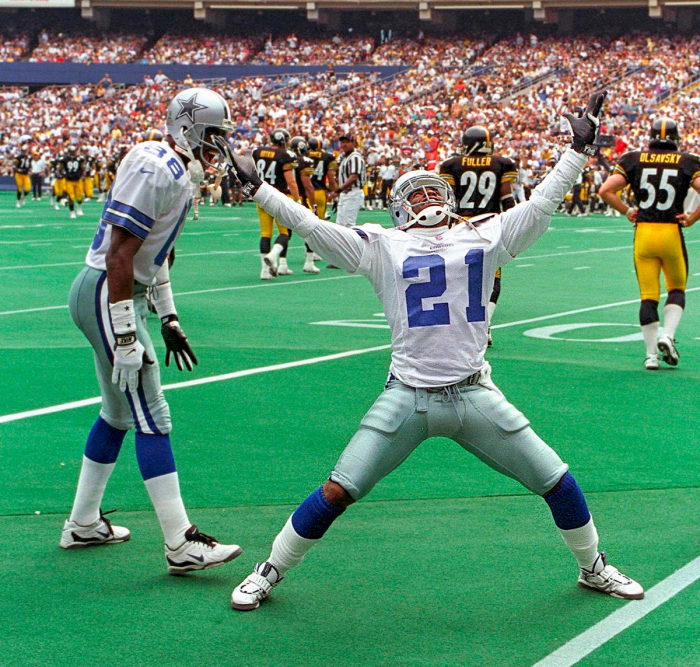
Sanders was known for his flash and big celebrations during his playing career, but he has adopted a strict approach as a coach.
Albert Dickson/Sporting News/Getty Images
Sanders’s voice carries on the practice field, increasingly hoarse, and verbal corrections come with the force of a summer squall (though the most profane words he ever utters are “durn” and “bull junk”). Like a good teacher, he misses nothing. He corrects players on everything from body language in team meetings to postgame attire.
Details matter.
“The small things really make your program go,” says Robinson. “Seeing him setting the vision for the program, and helping everyone understand what we’re doing and believing in the vision he had, was so important.”
Immediate results fed the belief. The Tigers came back in the fall and went unbeaten in the SWAC, their only regular-season loss coming at Louisiana-Monroe, an FBS program. Sanders, however, missed three games. After going in for surgery to repair a dislocated toe on his left foot last September, he developed blood clots and spent nearly a month in the hospital, primarily in the ICU. His big toe and the one next to it had to be amputated, and he lost nearly 40 pounds.
He coached three games, including the SWAC championship, from a motorized scooter.
“Sunday through Friday, he was so sick he didn’t talk to nobody,” says equipment manager Cedric Buckley. “But on Saturdays he’d be wide awake for game day. As soon as it ended, he’d be out of it again.”
That season ended in disappointment—an upset loss to South Carolina State in the Cricket Celebration Bowl—but the foundation was laid. Quarterback Shedeur Sanders, Deion’s son, earned FCS Freshman of the Year honors, passing for 3,231 yards with 30 touchdowns.
Shedeur, a four-star recruit, had helped his father land the best FCS recruiting class when he flipped his commitment from Florida Atlantic to JSU. He was, at the time, the highest-rated recruit to sign with an HBCU. Then Sanders put together his 2022 class; now Hunter holds that honor.
Shedeur Sanders signed with Jackson State because he wanted to play for the only coach he’d ever had. And Travis Hunter? He wanted to play for the only player he’d ever idolized.
Those two are clear about their motives: They want to return Jackson State to prominence and they want the school to be a catalyst to their NFL dreams. They’ve been teammates only a few months, but already they’ve forged a tight bond.
“We understand each other; we both had similar situations,” says Shedeur. “We came to Jackson State for the same reason: to make change.”
The returning quarterback (Shedeur) and arriving cornerback (Hunter) compete in everything. Before one practice this spring, Shedeur couldn’t help himself. “He said I’d never had a pick on him,” Hunter says with a smirk. “I was like: Just wait, it’s going to happen.” During one team drill that day, Hunter read receiver Shane Hooks’s route and accelerated toward the ball, thrown low and outside at the pylon. He made a diving one-handed interception.
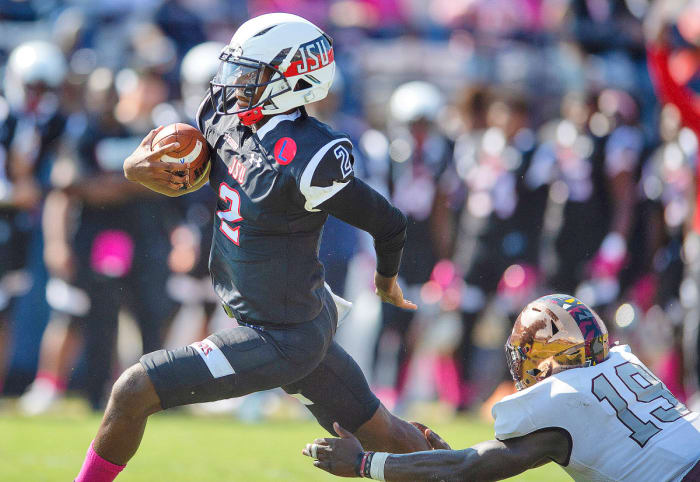
Last season, Shedeur Sanders earned the Jerry Rice Award as the top freshman in FCS football.
Eric Shelton/Clarion Ledger/USA Today Network
About those flipped recruits. For Shedeur, all it took was a one-hour chat between father and son a few weeks after Deion took the JSU job, and he was out at FAU. He understood the scrutiny and expectations that would accompany him, but being Prime Time’s son is the only life he’s ever known. “He’s been my dad my whole life. There’s not much difference between my dad and Coach. He’s definitely gonna yell a lot.” (Deion’s older son, Shilo, is a redshirt sophomore defensive back for the Tigers.)
With Hunter, it was more complicated. From the start, Sanders had refused to settle for traditional FCS recruits; he targeted elite players. Ultimately, the coach earned the trust of Hunter’s parents, telling them he could prepare their son better than anyone else for the NFL—but also that he could teach him how to make a brand of himself and how to succeed in life after his playing career ends.
Hunter had always dreamed of playing for Florida State; he visited Jackson State over homecoming only because he’d never met Sanders in-person—“I wasn’t passing up that opportunity,” he says. Once there, the more Hunter talked to Sanders about fishing and life (“I don’t even think we talked about football,” he says), the more he realized he wanted to play for the Hall of Famer.
And in Hunter, one can’t help but see some of his brash old coach. “Travis thinks he’s that dude,” Sanders says. “He wants to be that dude. He has it.”
While Shedeur spent his freshman season proving he could be an impact player, Hunter did it even earlier, in Jackson State’s spring game. Playing both cornerback and receiver, he intercepted two passes, scored on receptions of nine and 80 yards, and gained 25 yards on a reverse.
“I knew what kind of spring game he was going to have,” Sanders says. “Before the game I told him: ‘Breathe, stay calm and stay cool. . . . You don’t have to try to be something you already are. You already that dude.’ ”
Sanders wants to talk about the lie Nick Saban told about his program. But he wants to discuss it in the setting where he’s most comfortable—Country Prime, in the quaint town filled with mom-and-pop spots, where the closest neighbors seem to be a 5K away.
Settled comfortably on his patio, he’s enjoying a picturesque view of Lake Prime, where a black pontoon boat with red trim is docked. A laptop with a Jackson State IBELIEVE sticker rests on the coffee table beside him.
“This is my office,” says Sanders, wearing a black hoodie and matching joggers with slippers. “I do everything out here.”
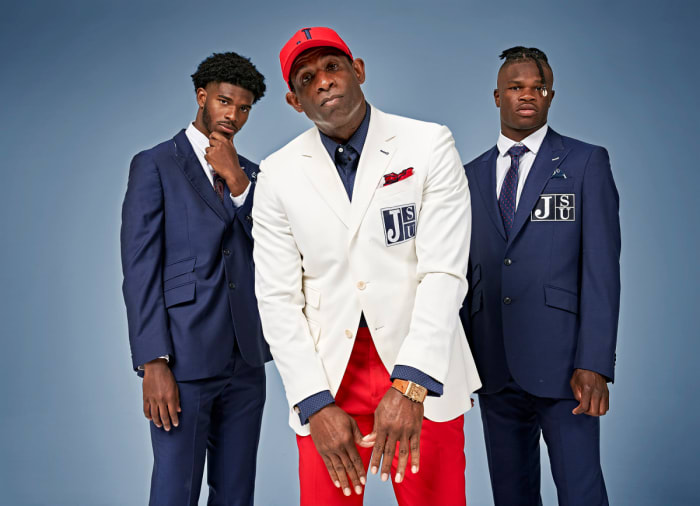
From left to right: Shedeur, Deion and Travis Hunter.
Marcus Smith/Sports Illustrated; Styling by Dominique Jasmin-Pasley
It’s a Thursday afternoon in May. Shedeur phoned his father the night before, waking Deion from a deep slumber, to ask whether he had heard about the comments Saban made to a room full of local business leaders in Birmingham regarding Jackson State’s football program.
“Jackson State paid a guy a million dollars last year that was a really good Division I player to come to school,” Saban had said. “It was in the paper. They bragged about it. Nobody did anything about it.” Saban never named the player, but he was clearly referring to Hunter. And at 11:08 p.m. Wednesday, Sanders responded, angrily, on Twitter: “We as a PEOPLE don’t have to pay our PEOPLE to play with our PEOPLE.”
Now, nature provides the soundtrack as Sanders settles in to discuss the lie.
“We never bought Travis,” Sanders says. “We never tried to buy Travis. Do I want Travis to have NIL deals? Certainly, I do. Do I want Travis to have some of the things his ability can allow him to acquire through NIL? Certainly, I do.”
There’s been speculation about how Hunter ended up at Jackson State since the day he flipped his commitment. As of May, he had two NIL deals worth less than $250,000 together. He is expected to finalize two more before fall practice begins.
Sanders rattles off a list of reasons why he’s the right coach for Hunter, with his experiences as a Hall of Fame cornerback and a media- and business-savvy superstar. “To insinuate the only way we could acquire somebody like that is to pay them $1 million,” Sanders says, “that didn’t sit well with me.”
Sanders says he considers Saban a friend. They’ve filmed a series of Aflac insurance commercials together over the past year, and Sanders has used that time to consult the Alabama coach on everything from practice schedules to schemes to motivation techniques. According to Sanders, the morning after his comments Saban reached out to talk. Sanders, though, says he isn’t interested in a private conversation.
“You can’t do that publicly and call privately,” he says. “I admire Coach Saban. He is the magna cum laude of college football coaches, and those statements don’t take away from what he’s accomplished. It wasn’t a good look for him. I didn’t look at it as a direct shot. I see what you’re trying to do. I see who you’re talking to. You’re naming us, but you’re talking to your donors and your boosters.”
Perhaps more than anything, Sanders believes Saban’s insinuation spoke poorly of Sanders’s coaching staff, his players, the university, the SWAC and all HBCUs.
Since arriving in Jackson, Sanders has been “very vocal about the need to elevate all the HBCU football programs,” says Hudson, JSU’s president. Most of the school’s games were televised on ESPN last season; that will happen again in 2022. The cable network also televised the Tigers’ spring game, a first for an HBCU program. Sanders has appeared on national TV and radio; his social media team takes fans behind the scenes of his program to Sanders’s 2.4 million followers on Instagram and 1.3 million on Twitter.
Sanders’s role has gone beyond increased exposure. When Alcorn State needed athletic trainers, he worked to secure help. He has vowed to aid Mississippi Valley State in getting a new practice field, and he’s been an advocate of HBCU programs’ receiving a more equitable split with promoters when the schools play Black college football classics, the regular-season matchups that also serve as celebrations of HBCU programs. Sanders pressured the NFL to more diligently scout HBCU players after none were selected in the 2021 draft.
“Anything you touch you have to have an effect on if you’re that kind of person,” Sanders says. “It is my objective not to just come to Jackson State and touch Jackson State, but to touch everything nearby.”
Since the day he arrived, other coaches—in the SWAC and beyond—have bristled at his lack of coaching experience, that he hadn’t paid his dues. Some envy the attention he receives. Those coaches don’t understand Sanders has always colored outside the lines and challenged those who ask him to conform. It’s a mentality that led to the creation of Prime Time, Sanders’s attention-seeking alter ego who revolutionized the cornerback position in the 1990s. And it’s an approach that helped Sanders play professional baseball and football simultaneously and become the first NFL player to play both ways since Chuck Bednarik did it in ’60.
Now, that same mentality is leading to a rebirth for HBCU programs. At the FCS level, Jackson State is on the precipice of becoming a powerhouse. And coaches at the FBS level will have to contend with a unique recruiter to whom, in some ways, they can’t measure up.
In April, four HBCU prospects were taken in the NFL draft. There are programs looking for their version of Coach Prime and aspiring coaches who look at Sanders and wonder whether they can do the same. Would Tennessee State have hired Tennessee Titans great Eddie George, who had no previous coaching experience, if not for Sanders’s early success? Would Hall of Famers Ed Reed, Ray Lewis and Marshall Faulk have flirted with HBCU programs if Sanders hadn’t created a buzz?
The college football landscape has changed, and Deion Sanders has carved out his space within it—for himself and his program, and for the next Coach Prime and his program.
For more HBCU coverage, visit FanNation's HBCU Legends
More SI Daily Cover Stories:
• Anatomy of a Second Chance: Josh McDaniels on Lessons Learned
• Browns Tanking Investigation: What the NFL Didn’t Tell You
• A Quarterback Evolution and a Coaching Revolution
